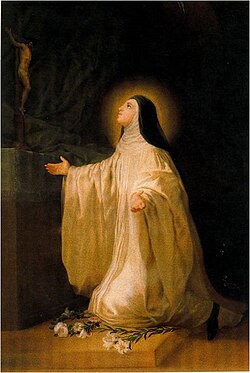Lutgardis
| Saint Lutgardis | |
|---|---|

Santa Lutgarda by Goya, 1787. Monasterio de San Joaquín y Santa Ana, Valladolid.
|
|
| Born | 1182 Tongeren, Belgium |
| Died | June 16, 1246 Aywières, Belgium |
| Venerated in | Roman Catholic Church |
| Feast | June 16 |
| Attributes | as Christ shows her His wounded side; blind Cistercian abbess; Cistercian nun being blinded by the Heart of Jesus; Cistercian to whom Christ extends his hand from the cross; in attendance when Christ shows his Heart to the Father |
| Patronage | birth; blind people; blindness; childbirth; disabled people; handicapped people; physically challenged people; Flanders; Flemish National Movement |
Saint Lutgardis of Aywières (Dutch: Sint-Ludgardis; 1182 – 16 June 1246; also spelled Lutgarde) was a Flemish saint. She was born in Tongres in Belgium (for which she is also called "Lutgardis of Tongres"), and entered into religious orders at the age of twelve. During her life various miracles were attributed to her, and she is known to have experienced religious ecstasies. Her feast day is June 16.
Lutgardis was born at Tongres (Tongeren) in 1182. She was admitted into a Benedictine monastery of St. Catherine near Sint-Truiden at the age of twelve, not for any vocation but because her dowry had been lost in a failed business venture. She was attractive, fond of nice clothes and liked to enjoy herself. For Lutgarde, as for so many other women of her time, the cloister represented a socially acceptable alternative to the disgrace of unmarried life in the world. She lived in the convent for several years without having much interest in religious life. She could come and go as she pleased; and received visitors of both sexes.
According to her Vita, it was in the parlour, a welcome break in the monotony of monastic observance, that she was visited with a vision of Jesus showing her his wounds, and at age twenty became a Benedictine nun. Some of the sisters predicted that her change in behavior would not last. Instead, she became even more devout. Over the next dozen years, she had many visions of Jesus, Mary and St. John the Evangelist.Robert Bellarmine relates a story that Innocent III, when recently deceased, appeared to Lutgardis in her monastery to thank her for the prayers and sacrifices she had offered for him during his reign as Roman Pontiff.
Accounts of her life state that she experienced ecstasies, levitated, and dripped blood from her forehead and hair when entranced. She refused the honor of serving as abbess. However, in 1205, she was chosen to be prioress of her community.
...
Wikipedia
